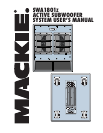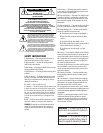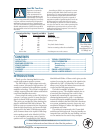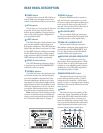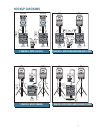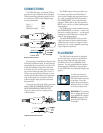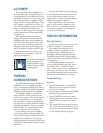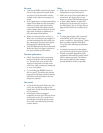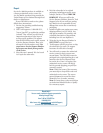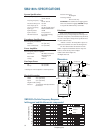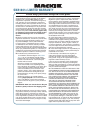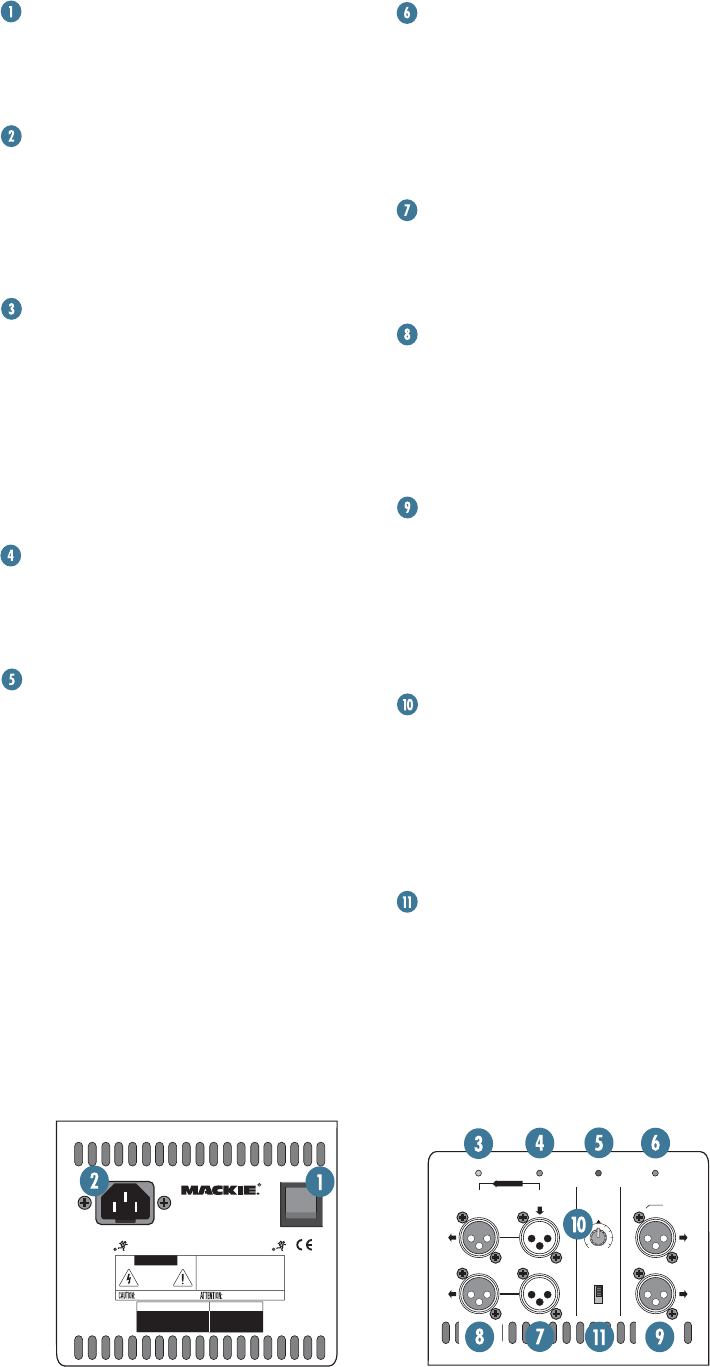
4
REAR PANEL DESCRIPTION
POWER Switch
Use this switch to turn the SWA1801z on
and off. Make sure the sig nal source’s lev el
con trol is turned down before you turn it on.
AC Receptacle
This is where you connect the AC line cord
to provide AC power to the SWA1801z’s
built-in power am pli fi ers. Plug the line cord
into an AC sock et prop er ly con fi g ured for
your par tic u lar model.
LIMIT Indicator
The SWA1801z has a built-in limiter that
pre vents the amplifi er outputs from over-
driving the transducers. The
LIMIT
in di ca tor
lights when the limiter is activated. It’s okay
for the
LIMIT
indicator to blink oc ca sion al ly,
but if it blinks fre quent ly or lights continu-
ously, turn down the level con trol until the
LIMIT
indicator only blinks occasionally.
SIGNAL Present Indicator
This LED illuminates whenever there is
a signal present at the
FULL RANGE INPUT
con nec tor on the rear panel.
THERMAL Indicator
The SWA1801z has a thermal protection
circuit that monitors the internal tem per a-
ture of the amplifi ers and heatsink. If the
in ter nal temperature should exceed a safe
op er at ing level, this indicator lights and the
sig nal is mut ed to al low the amplifi er to cool.
When the tem per a ture cools to a safe level
once again, the ther mal protection cir cuit
de ac ti vates and normal operation resumes.
Note:
Activation of the thermal pro tec tion
circuit is an indication that you should take
steps to avoid continued ther mal prob lems.
See “Thermal Considerations” on page 7.
POWER Indicator
When the
POWER
switch is turned on
and the linecord is connected to an active
AC power supply, this indicator lights green
to let you know that you’re ready to rock
and roll. The cool blue LED on the front of
the cabinet works in the same way.
FULL RANGE INPUT
These are female XLR-type connectors
that accept a balanced line-level signal from
a mixing console or other signal source.
THRU (FULL RANGE OUTPUT)
These are male XLR-type connectors
that produce exactly the same signal that is
con nect ed to the
FULL RANGE INPUT
jack.
Use it to dai sy-chain several SWA1801z's
to geth er off the same sig nal source.
HIGH PASS (MID/HIGH FREQ) OUTPUT
These are male XLR-type connectors
that produce the frequencies above 120Hz.
Con nect these to a pair of full-range active
speak ers or to an amplifer/passive speaker
com bi na tion. The SWA1801z reproduces
the fre quen cies below 120Hz.
SUBWOOFER LEVEL Control
This adjusts the subwoofer level. The
cen ter detent position provides 15 dB of
head room with a nominal +4 dBu input
sig nal. Use this as a starting point for set ting
the balance between the subwoofer and the
main speakers.
PHASE
This switch reverses the polarity of the
subwoofer output. De pend ing on the place-
ment of the SWA1801z subwoofer relative
to the full-range speak ers, you may get a
better low-fre quen cy re sponse in the room
if you re verse the po lar i ty of the subwoofer’s
sig nal. Ex per i ment with this switch to de-
ter mine which po si tion sounds best.
ED
-7£nä£â
/6Ê-17"",
FEM;H
,&>p#''+L#79<KI;79'(+L#J.7B
7!2.).'
4()3352&!#%-!92%!#(()'(4%-0%2!452%$52).'
34!.$!2$53%4/%.352%02/0%2/0%2!4)/.!,,/7!-).)-5-/&).3
/&#,%!2!.#%&2/-4()3352&!#%!.$!$%15!4%6%.4),!4)/.4/2%$5#%
4(%2)3+/&%,%#42)#3(/#+$/./42%-/6%4()30!.%,/2!.9!44!#(%$
#/-0/.%.4.//0%2!4/23%26)#%!",%0!243).3)$%2%&%23%26)#).'4/
15!,)&)%$0%23/..%,4/2%$5#%4(%2)3+/&&)2%/2%,%#42)#3(/#+$/./4
%80/3%4()3!00,)!.#%4/2!)./2-/)3452%
H?IAE<;B;9JH?9I>E9A
:EDEJEF;D
2%0,!#%7)4(4(%3!-%490%&53%!.$2!4).'
$)3#/..%#43500,9#/2$"%&/2%#(!.').'&53%
54),)3%5.&53)",%$%2%#(!.'%$%-´-%490%
$%"2!.#(%2!6!.4$%2%-0,!#%2,%&53)",%
97KJ?ED
!6)3
2)315%$%#(/#%,%#42)15%.%0!3/562)2
I;H?7BDKC8;H
C7DK<79JKH?D=:7J;
:;I?=D;:8OC79AE?:I?DMEE:?DL?BB;"M7"KI7
(&&+BEK:J;9>DEBE=?;I?D9$
C79A?;7D:J>;HKDD?D=C7D<?=KH;7H;H;=?IJ;H;:JH7:;C7HAIE<
BEK:J;9>DEBE=?;I?D9$0F7J;DJF;D:?D=
FEM;HJ>;HC7B
J>HK
<KBBH7D=;EKJFKJ
>?=>F7II
C?:%>?=><H;G
EKJFKJ
IK8MEE<;H
9EDJHEB
<KBBH7D=;
?DFKJ
F7H7BB;B
'(&>p
DEHC7B
H;L'.&
F>7I;
B
H
B
H
IK8MEE<;H
B;L;B
!*Z8k
DEHC7B
!'+
EE
?D
EKJ
I?=D7B
B?C?J



